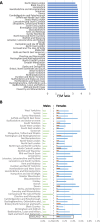Unequal access to diagnosis of myalgic encephalomyelitis in England
- PMID: 40259275
- PMCID: PMC12012970
- DOI: 10.1186/s12889-025-22603-9
Unequal access to diagnosis of myalgic encephalomyelitis in England
Abstract
Background: People with Myalgic Encephalomyelitis (ME/CFS; sometimes referred to as chronic fatigue syndrome) experience poor health-related quality of life and only rarely recover. ME/CFS has no curative treatment, and no single diagnostic test. Public health and policy decisions relevant to ME/CFS require knowledge of its prevalence and barriers to diagnosis. However, people with ME/CFS report lengthy diagnostic delays and prevalence estimates vary greatly due to uneven diagnosis and misdiagnosis. Factors that influence diagnosis could be revealed by stratifying a single population by gender, age and ethnicity.
Methods: Hospital Episode Statistics data, routinely collected by the NHS in England, was downloaded from the Feasibility Self-Service of NHS DigiTrials. This was used to stratify individuals with the ICD-10 code that best reflects ME/CFS symptoms (G93.3) according to age, self-reported gender and ethnicity, General Practice and NHS England Integrated Care Board (ICB).
Results: In all, 100,055 people in England had been diagnosed with ME/CFS (ICD-10:G93.3) between April 1 1989 and October 7 2023, 0.16% of all registered patients. Of these, 79,445 were females and 20,590 males, a female-to-male ratio of 3.88:1. Female relative to male prevalence peaked at about 6-to-1 in individuals' fourth and fifth decades of life. Prevalence varied widely across the 42 ICBs: 0.086%-0.82% for females and 0.024%-0.21% for males. White individuals were approximately fivefold more likely to be diagnosed with ME/CFS than others; Black, Asian or Chinese ethnicities are associated with particularly low rates of ME/CFS diagnoses. This ethnicity bias is stronger than for other common diseases. Among active English GP practices, 176 (3%) had no registered ME/CFS patients. Eight ICBs (19%) each contained fewer than 8 other-than-white individuals with a G93.3 code despite their registers containing a total of 293,770 other-than-white patients.
Conclusion: Other-than-white ethnic groups, older females (> 60y), older males (> 80y), and people living in areas of multiple deprivation are disproportionately undiagnosed with ME/CFS. Lifetime prevalence of ME/CFS for English females and males may be as high as 0.92% and 0.25%, respectively, or approximately 404,000 UK individuals overall (0.6%). This improved estimate of ME/CFS prevalence allows more accurate assessment of the socioeconomic and disease burden imposed by ME/CFS.
Keywords: Ethnicity bias; Gender bias; Myalgic Encephalomyelitis prevalence; NHS England.
© 2025. The Author(s).
Conflict of interest statement
Declarations. Ethics approval and consent to participate: NHS data is copyright © 2022, NHS England, re-used with the permission of NHS England. All rights reserved. Access to this data was provided by NHS DigiTrials and the Feasibility Self-Service whose legal basis for collecting the data is the Public task and Health and Social Care Act – General powers. The legal basis for NHS DigiTrials and the Feasibility Self-Service’s processing of personal information is described here: https://digital.nhs.uk/services/nhs-digitrials/nhs-digitrials-service-transparency-notice . Consent is not the basis for data processing. Consent for publication: Not applicable. Competing interests: The authors declare no competing interests.
Figures




Similar articles
-
Prevalence of myalgic encephalomyelitis/chronic fatigue syndrome (ME/CFS) in three regions of England: a repeated cross-sectional study in primary care.BMC Med. 2011 Jul 28;9:91. doi: 10.1186/1741-7015-9-91. BMC Med. 2011. PMID: 21794183 Free PMC article.
-
Defining the prevalence and symptom burden of those with self-reported severe chronic fatigue syndrome/myalgic encephalomyelitis (CFS/ME): a two-phase community pilot study in the North East of England.BMJ Open. 2018 Sep 19;8(9):e020775. doi: 10.1136/bmjopen-2017-020775. BMJ Open. 2018. PMID: 30232103 Free PMC article.
-
Trends in the incidence of chronic fatigue syndrome and fibromyalgia in the UK, 2001-2013: a Clinical Practice Research Datalink study.J R Soc Med. 2017 Jun;110(6):231-244. doi: 10.1177/0141076817702530. Epub 2017 Mar 30. J R Soc Med. 2017. PMID: 28358988 Free PMC article.
-
Systematic review and meta-analysis of the prevalence of chronic fatigue syndrome/myalgic encephalomyelitis (CFS/ME).J Transl Med. 2020 Feb 24;18(1):100. doi: 10.1186/s12967-020-02269-0. J Transl Med. 2020. PMID: 32093722 Free PMC article.
-
Review of Myalgic Encephalomyelitis/Chronic Fatigue Syndrome: an evidence-based approach to diagnosis and management by clinicians.Rev Environ Health. 2015;30(4):223-49. doi: 10.1515/reveh-2015-0026. Rev Environ Health. 2015. PMID: 26613325 Review.
Cited by
-
Defining a High-Quality Myalgic Encephalomyelitis/Chronic Fatigue Syndrome cohort in UK Biobank.NIHR Open Res. 2025 Apr 28;5:39. doi: 10.3310/nihropenres.13956.1. eCollection 2025. NIHR Open Res. 2025. PMID: 40443420 Free PMC article.
-
Replicated blood-based biomarkers for myalgic encephalomyelitis not explicable by inactivity.EMBO Mol Med. 2025 Jul;17(7):1868-1891. doi: 10.1038/s44321-025-00258-8. Epub 2025 Jun 20. EMBO Mol Med. 2025. PMID: 40537675 Free PMC article.
References
-
- Committee on the Diagnostic Criteria for Myalgic Encephalomyelitis/Chronic Fatigue Syndrome; Board on the Health of Select Populations; Institute of Medicine. Beyond Myalgic Encephalomyelitis/Chronic Fatigue Syndrome: Redefining an Illness. 2015.
-
- Cairns R, Hotopf M. A systematic review describing the prognosis of chronic fatigue syndrome. Occup Med (Lond). 2005;55:20–31. - PubMed
MeSH terms
Grants and funding
LinkOut - more resources
Full Text Sources
Medical
Miscellaneous

